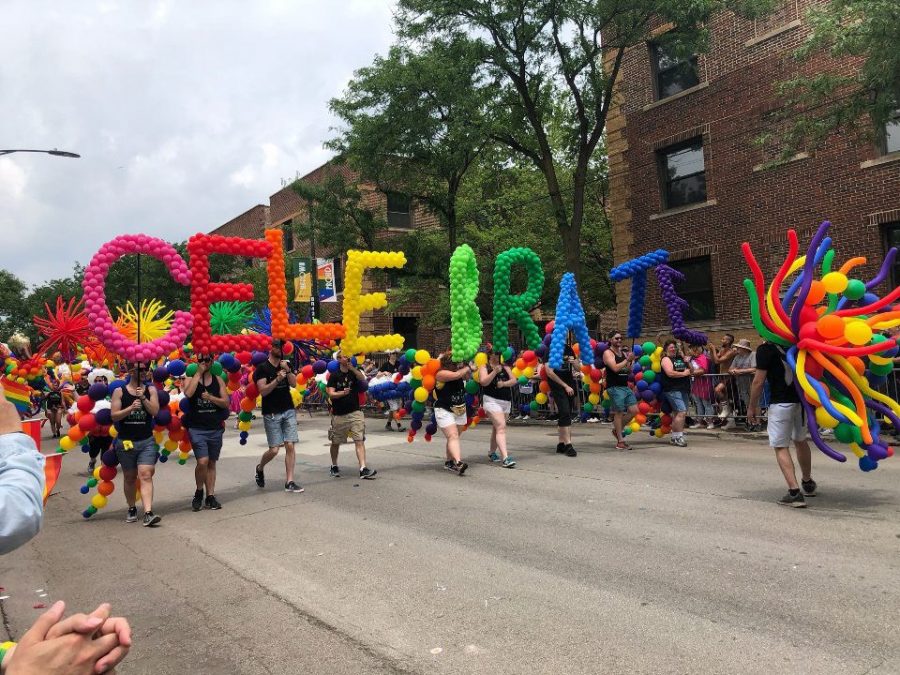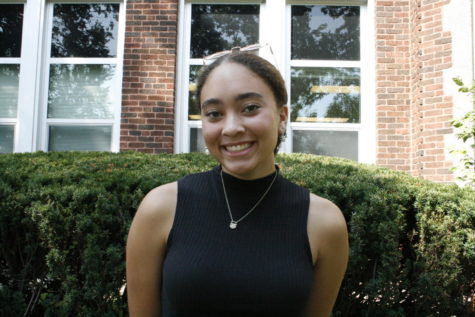New Illinois bill requires LGBT individuals to be included in history curriculum
People holding up balloons at the pride parade.
August 26, 2019
On August 9th of 2019, Illinois governor, J.B. Pritzker, signed a bill that now requires all public schools in the state of Illinois to include historical contributions of everyone protected under the Illinois Human Rights Act-specifically lesbian, gay, bisexual, and transgender individuals.
House Bill 246 states, “Provides that the teaching of history of the United States in public schools shall include a study of the role and contributions of lesbian, gay, bisexual, and transgender people in the history of this country and this State. Requires every public elementary school and high school to include in its curriculum a unit of instruction studying the significant role of lesbian, gay, bisexual, and transgender individuals in society.”
The bill also necessitates the purchase of all-inclusive and non-discriminatory textbooks.
While this new educational content is supposed to be taught to students before they go to the 8th grade, this bill has public high schools all around the country, including Riverside Brookfield High School, wondering how it will alter not only their curriculum but the climate of their schools.
Kylie Lindquist is the Assistant Principal for Curriculum and Instruction at RBHS. Since the bill won’t be effective until January 1, 2020, the school has yet to receive specific details explaining if and how the requirements of House Bill 246 will directly affect RB. However, even with limited information about the subject, Lindquist believes the effect of the bill will be positive no matter what.
“Our students are going to come to RB with more knowledge [and] understanding of the contributions of non-straight-white men … One of the complaints about history in education is that we [only] teach [about] straight white men. In the last decade in education, there really has been a push to recognize the contributions of other people,” said Lindquist.
In terms of students’ reactions to the bill, Lindquist says that she hopes it will create a greater sense of community and comfortability for them within the school.
“I feel like some of our LGBTQ+ population aren’t going to feel sidelined maybe as much as they have [in the past] and those individuals might feel like they can have a greater voice,” said Lindquist. “Once you’re recognized in history, there’s something about that that legitimizes you. You might feel confident in who you are but It’s hard when history makes you feel like you don’t exist.”
Lindquist does not see this new policy as matters of politics nor controversy. She simply sees this as an opportunity to improve the overall environment of RB and student-teacher relations.
“That is what education is all about; [It’s about] learning about the other kinds of people outside of you … If there are negatives that come with it, I think that we’re going to be strong enough as a school to respectfully disagree but at the same time not allow people to attack or marginalize any of our students for any reason,” said Lindquist.
Maggie Leiteritz, guidance counselor and the sponsor for SAGA (Sexual and Gender Alliance), formerly known as RBGSA (Riverside Brookfield Gay-Straight Alliance), also expects that the new curriculum changes will increase the sense of comfort and acceptance LGBTQ+ students feel at RB.
“Anytime you have a law that includes others, it’s going to make people feel welcomed, it’s going to validate them, and I’m all for it. I think most kids don’t know about this [the bill] but I think they’re going to be thrilled to know that they’re going to be learning about this stuff within their history classes,” said Leiteritz.
As stated above, because the bill is so recent, it would be premature to state exactly what the administration and history department have to reform (if anything at all). But, Lindquist confirms that if the curriculum were to change at all, a formal process including the approval from the board of education would need to happen. In that case, teachers could take advantage of teacher autonomy in order to decide how they would incorporate the new material within their classes.
Lindquist and Leiteritz hope that no matter how House Bill 246 is implemented at RBHS, at the very least it sparks conversation and inspires those in the community to be unafraid to be themselves.
“I hope it enlightens kids who are not [apart of] the LGBTQ community and maybe humanizes the community a little bit more and shows them [non-LGBTQ students] that it’s not about your sexual orientations, or your color, or your religion,” said Leiteritz. “Everybody can contribute to society and we need to honor these people, accept their differences, and treat people with respect.”





Bridget Maher • Sep 6, 2019 at 3:56 am
This is so good omg
Claire Harrison • Aug 27, 2019 at 8:37 am
Great article, Shalah!